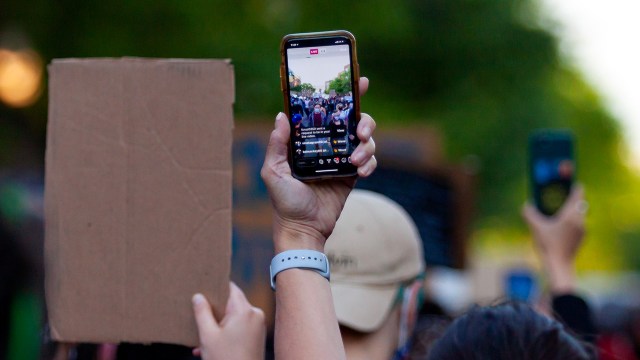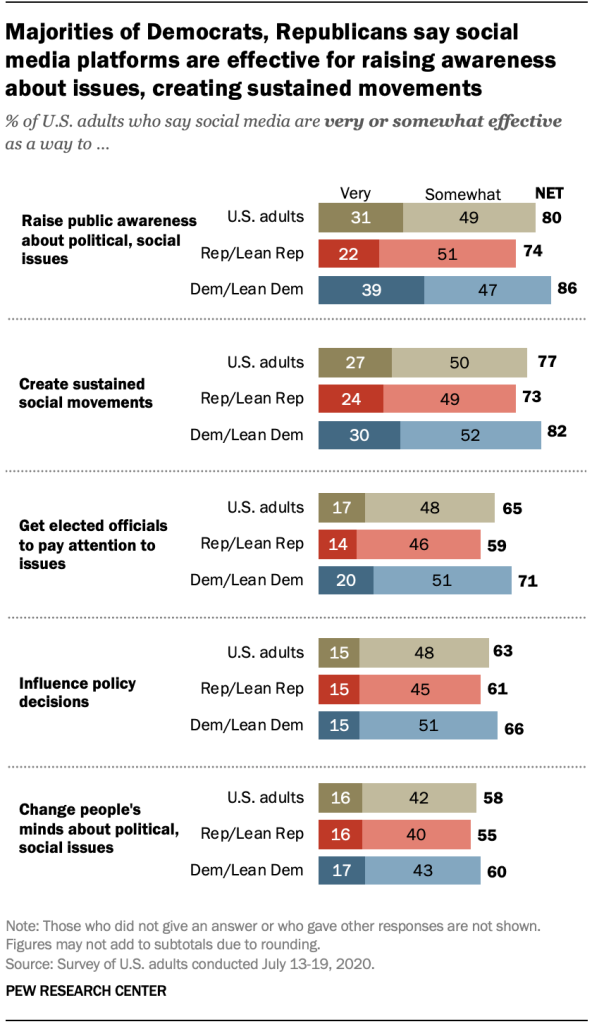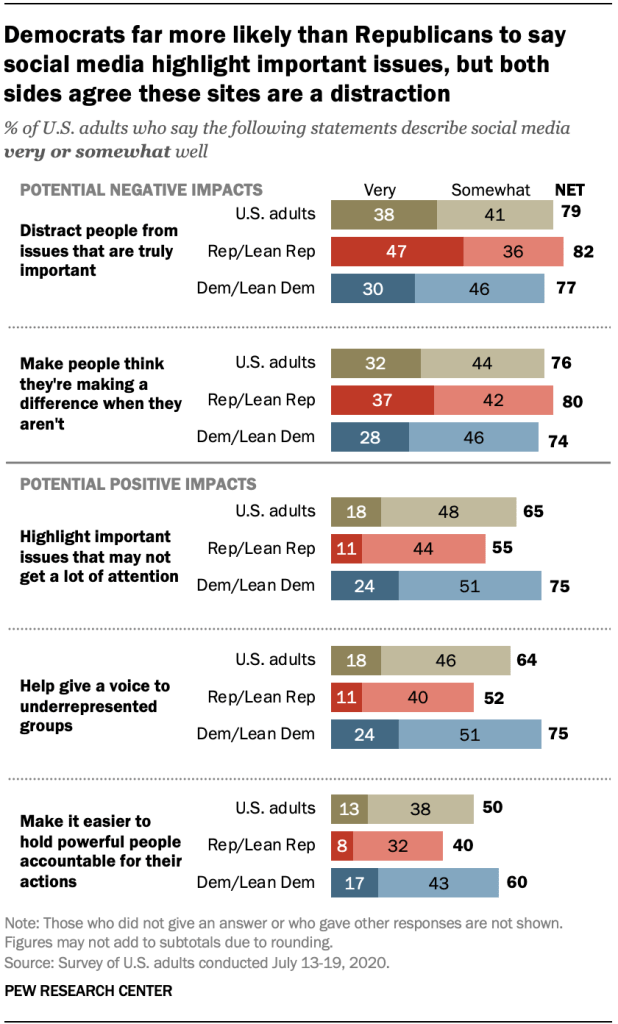
Social media platforms are important for political and social activists. But while most Americans believe these platforms are an effective tool for raising awareness and creating sustained movements, majorities also believe they are a distraction and lull people into believing they are making a difference when they’re not, according to a new Pew Research Center survey.
Overall, eight-in-ten Americans say social media platforms are very (31%) or somewhat (49%) effective for raising public awareness about political or social issues, according to the survey of U.S. adults conducted July 13-19. A similar share (77%) believes these platforms are at least somewhat effective for creating sustained social movements.
Smaller shares – though still majorities – say social media are at least somewhat effective in getting elected officials to pay attention to issues (65%), influencing policy decisions (63%) or changing people’s minds about political or social issues (58%).
Pew Research Center conducted this study to understand how Americans think about the effectiveness of social media as a tool for social and political activism, change and engagement. For this analysis, we surveyed 10,211 U.S. adults from July 13 to 19, 2020. Everyone who took part is a member of the Center’s American Trends Panel (ATP), an online survey panel that is recruited through national, random sampling of residential addresses. This way nearly all U.S. adults have a chance of selection. The survey is weighted to be representative of the U.S. adult population by gender, race, ethnicity, partisan affiliation, education and other categories. Read more about the ATP’s methodology.
Here are the questions used for this report, along with responses, and its methodology.
Across political parties, more describe these platforms as effective rather than ineffective when it comes to achieving these goals. Still, there are some partisan differences.
Democrats and independents who lean Democratic are more likely than Republicans and Republican leaners to say social media sites are at least somewhat effective as a way to raise public awareness about political or social issues (86% vs. 74%), create sustained social movements (82% vs. 73%) and get elected officials to pay attention to issues (71% vs. 59%). Partisan gaps are more modest when it comes to these platforms’ effectiveness at influencing policy or changing people’s minds.
Democrats also stand out as seeing social media platforms as very effective for raising awareness: 39% of Democrats say social media are very effective at this, compared with 22% of Republicans.
Related: 55% of U.S. social media users say they are ‘worn out’ by political posts and discussions
While younger Americans are more likely than their older counterparts to use some social media platforms, there are few age-related differences in views of these sites’ effectiveness for political engagement – and party differences persist even among younger adults for some goals. For example, 87% of Democrats ages 18 to 29 say social media sites are at least somewhat effective for raising awareness, compared with 76% of Republicans in the same age group. Democrats ages 18 to 29 are also more likely than their Republican counterparts to say these sites are at least somewhat effective at creating sustained social movements (84% vs. 74%) and getting elected officials to pay attention to issues (72% vs. 60%).
Leading up to the presidential election, social media platforms have played a role in raising awareness about voting issues, spreading information about the presidential candidates and allowing users to engage in online activism and campaigning. But when asked about social media’s broader impact on political discourse, there are some signs that Americans think these platforms can have both positive and negative effects.
On the more positive side, about two-thirds of Americans say the statements “social media highlight important issues that might not get a lot of attention otherwise” (65%) and “social media help give a voice to underrepresented groups” (64%) describe social media very or somewhat well. Half of Americans also say the statement “social media make it easier to hold powerful people accountable for their actions” describes these platforms at least somewhat well.
But even larger shares of the public think these platforms are distractions and that people may be engaging in “slacktivism” – a term critics have used to describe activism online. Roughly eight-in-ten Americans (79%) say the statement “social media distract people from issues that are truly important” describes social media very or somewhat well, while a similar share (76%) say the same about the statement “social media make people think they are making a difference when they really aren’t.”
Democrats are more likely than Republicans to see positive impacts of social media. For instance, three-quarters of Democrats say the statement “social media highlight important issues that may not get a lot of attention otherwise” describes these platforms at least somewhat well, compared with 55% of Republicans. Democrats are also more likely than Republicans to say these platforms help give a voice to underrepresented groups (75% vs. 52%) and make it easier to hold powerful people accountable for their actions (60% vs. 40%).
By comparison, there is more partisan agreement when it comes to some negative aspects of using social media platforms for political engagement. However, Republicans are a bit more likely than Democrats to believe that social media distract people from issues that are truly important (82% vs. 77%) or make people think they are making a difference when they really aren’t (80% vs. 74%).
Younger Americans tend to have a more positive outlook about the societal impact of social media. But as with political engagement, partisan differences still exist within the youngest age group. For instance, 70% of Democrats ages 18 to 29 say social media make it easier to hold powerful people accountable for their actions, compared with 49% of Republicans in the same age group. Young Democrats are also more likely than their GOP counterparts to say social media help give a voice to underrepresented groups (82% vs. 63%) and highlight important issues that might not otherwise get attention (79% vs. 64%).
Americans’ views on some of these issues are statistically unchanged since 2018, the last time the Center asked these questions. For example, there has been no notable change in people’s views about social media helping to give a voice to underrepresented groups, highlighting important issues and distracting people from important issues.
Still, there has been modest change when it comes to the perception that social media make it easier to hold powerful people accountable for their actions. Half of Americans now say this, down from 56% in 2018. At the same time, there has been an uptick in the share of Americans who say social media platforms are making people think they are making a difference when they really aren’t, from 71% in 2018 to 76% in the new survey.
Some of these changes persist when looking at partisan affiliation. The share of Republicans who say social media make it easier to hold powerful people accountable for their actions has dropped from 51% in 2018 to 40% today, while views are unchanged among Democrats. Meanwhile, Democrats have become slightly more likely to say social media make people think they are making a difference when they really aren’t (+7 percentage points), while Republican views are more consistent across years.
Note: This is part of a series of blog posts leading up to the 2020 presidential election that explores the role of social media in politics today. Here are the questions used for this report, along with responses, and its methodology.

